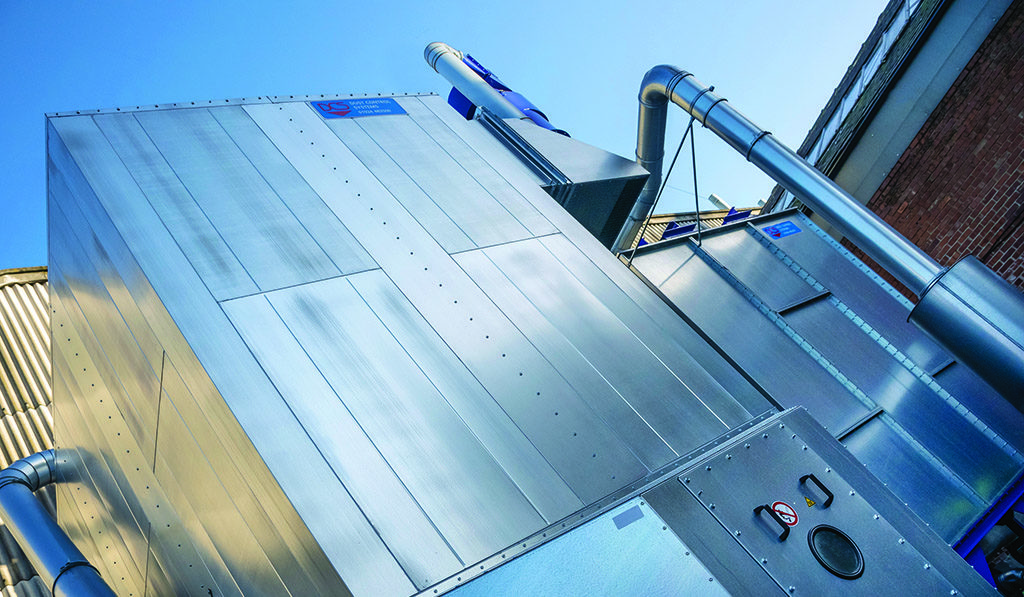
Following the company’s recent relocation to larger premises Sampson Products Ltd, a West Yorkshire-based timber processing and furniture component manufacturer, has benefitted from the extraction expertise that Dust Control Systems Ltd (DCS) (now part of Filtermist Systems Limited) consistently delivers to the UK woodworking industry.
As the company’s managing director, Simon Banks, explains: “Sampson Products was previously occupying part of an old two-storey mill, but the space was not ideally-suited to the needs of our expanding manufacturing output.” In spring last year, however, an opportunity arose to move the business to a more appropriate large open mill building just 2 minutes down the road, mostly on one level, but with ramps allowing fork truck access to all areas. “The layout of the old factory meant that all dust and woodwaste extraction was provided by a number of independent open-bag filter units, but the relocation presented us with the chance to investigate alternative extraction equipment and, specifically, the possibilities and benefits of implementing an integrated system.
“We invited a few companies to evaluate our extraction requirements at the new premises, but Dust Control Systems was selected to undertake the project based on its comprehensive appraisal of our needs; the team took an interest in our company and fully appreciated the challenges of our manufacturing process – including identifying and accommodating potential future changes.”
Ray Townley, Area Sales Manager at DCS, continues: “The bulk of the wood waste produced at Sampson Products comes from two Weinig Unimat planer moulders; typically generating around 3 to 4 tonnes of clean Scandinavian softwood shavings every day. Rather than paying for disposal, Simon was keen to monetise the waste shavings and had purchased a second hand baling machine ready for installation at the new factory.”
At the heart of the system proposed by DCS is an externally-sited NFKZ3000 2+1 HJLR modular chain filter which has the capacity to handle around 18,000m3 of waste-laden air every hour, and includes integrated regeneration fans to provide powerful online reverse-air cleaning of the patented antistatic SUPERBAG filter media. Constructed from galvanised steel panels, this compact, cost-efficient unit comprises two filter modules plus one inlet module and, with a combined inspection and explosion relief door fitted to each module, is fully ATEX-approved. NFKZ3000 modular filter units are virtually maintenance-free and are designed for continuous operation; ideal for timber processing factories such as Sampson Products where planer moulders are profiling softwood furniture components around-the-clock.
Powered by a 30kW motor, the direct drive main fanset extracts woodwaste from the workshop, via 600mm diameter FastClip ductwork; delivering it to the filter unit where the softwood shavings collect in the base of the hopper section. A chain and flight conveyor continually directs the collected waste to the outfeed end of the hopper where it is discharged pressure-free, via a rotary valve, before being propelled by an 11kW transport fan, to a height of over 8 metres, where the waste enters a cyclone unit mounted directly above an adjacent storage silo. From here the shavings are transferred by a second rotary valve, again pressure-free, into the 30m3 capacity silo. Manufactured by the fabrication team responsible for Gallito products, the silo is a galvanised steel panel construction with several sight windows to visually monitor the fill level, plus a rotary paddle level switch which triggers an audible alarm as the maximum fill height is neared. Once sufficient volume has accumulated in the silo, the shavings are discharged via screw conveyor and through a rotary valve, before a second transport fan blows the material to the baler. Above the baler, DCS installed an NFSZ 1 HELR filter to quickly slow the flow of shavings which are finally delivered to the baler for packing into 20kg bags ready for sale as animal bedding.
To allow uninterrupted production when the baler is undergoing maintenance, design engineers at DCS also included a manually-operated safety divert to one of the redundant bag filter units. Other machines such as the cross-cut saws and double end tenoner, which generate a finer dust waste, along with a couple of clean-up hoses, continue to utilise 2 of the company’s existing bag filter extraction units – as part of the turnkey project, DCS re-sited the bag units at the new premises and installed a new FastClip galvanised ductwork system throughout.
Simon Banks has nothing but praise for the DCS sales and engineering team: “The project was undertaken over a period of 4 weeks at the end of the summer” says Simon, “and I had no complaints whatsoever with the installation. We had access to the new premises before we had to vacate the old factory, so DCS were able to plan and install the complete system in readiness for machines to be re-sited. Once the extraction was up and running, the team of engineers from DCS simply fitted in with our production schedule and, since we have two of each of our key production machines, we were able to continue production on one machine at the old site while DCS fitted extraction to the other one at the new premises.”
In conclusion, Ray Townley added: “The modular construction of the NF3000 series of filter units allows for a straightforward expansion of the system when required – effectively future-proofing the extraction system to accommodate potential growth in output at Sampson Products.”